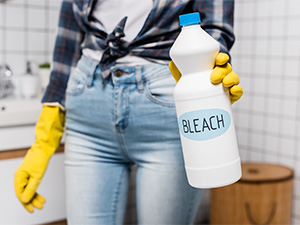
The Safety of Chlorine Bleach on Stone Surfaces: Unveiling the Facts
When it comes to cleaning stone surfaces, it is crucial to be well-informed about the products and techniques you use. One common question that arises is whether chlorine bleach is safe to use on stone surfaces. Chlorine bleach is a powerful disinfectant and stain remover, but its compatibility with various materials, including stone, is a subject of concern. Let’s explore the impact of chlorine bleach on stone surfaces, weighing its pros and cons to help you make an informed decision.
Understanding Stone Surfaces
Stone surfaces can vary greatly in their composition, durability, and porosity. Popular types of stone used in households include granite, marble, limestone, Quartzite, Onyx, and slate. These materials have different levels of susceptibility to damage and staining, necessitating different care approaches.
The Effects of Chlorine Bleach
Chlorine bleach, typically a solution of sodium hypochlorite, is known for its ability to remove stains and disinfect various surfaces. (Clorox is the most well-known brand). However, it is important to note that chlorine bleach is a highly reactive substance and can have detrimental effects on certain materials.
- Discoloration: Stone surfaces, particularly those made of natural, unsealed materials, are vulnerable to discoloration when exposed to chlorine bleach. The bleach reacts with the minerals present in the stone, resulting in permanent stains or lightening of the surface color(s).
- Surface Degradation: Chlorine bleach can weaken the structural integrity of certain types of stone. Bleach is an oxidizing agent that can break down organic compounds, and stone surfaces often contain small amounts of organic material. Prolonged or repeated use of bleach can cause the stone to become brittle, leading to cracks, pitting, or erosion over time.
- Sealer Damage: Stone surfaces are commonly sealed to enhance their resistance to staining and damage. Chlorine bleach can degrade the protective sealant, making it less effective or even ineffective altogether. This can leave the stone more susceptible to future stains and damage.
Alternative Cleaning Methods
While chlorine bleach may not be the ideal choice for cleaning stone surfaces, there are alternative methods that are safer and more appropriate:
- pH-Neutral Cleaners: Choose pH-neutral cleaners specifically formulated for stone surfaces. These cleaners are non-acidic and non-alkaline, ensuring they do not react with the stone and cause damage. They are effective in removing dirt, grime, and light stains without compromising the integrity of the stone.
- Gentle Cleaning Techniques: For routine cleaning, use soft microfiber cloths or sponges along with mild soaps or detergents. Avoid abrasive cleaners or scouring pads that can scratch the stone. Regular and gentle cleaning can help maintain the appearance and longevity of stone surfaces.
- Professional Advice: If you encounter stubborn stains or require in-depth cleaning, it is advisable to seek professional help. Professional stone care experts have the knowledge and experience to assess the type of stone and decide the appropriate cleaning methods and products for best results.
While chlorine bleach may be an effective disinfectant and stain remover for some surfaces, it is not recommended for use on stone surfaces. The potential for discoloration, surface degradation, and damage to sealants outweigh any benefits it may provide. Opting for pH-neutral cleaners, employing gentle cleaning techniques, and seeking professional advice when needed are more appropriate ways to care for and maintain the beauty of stone surfaces. By choosing the right cleaning methods, you can ensure the longevity and visual appeal of your stone surfaces without compromising their integrity.
By Fred Hueston. This article is one of a series of articles written and published on behalf of Surface Care PRO Partners.


